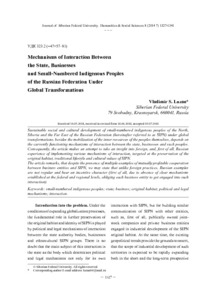Mechanisms of Interaction Between the State, Businesses and Small-Numbered Indigenous Peoples of the Russian Federation Under Global Transformations
Скачать файл:
URI (для ссылок/цитирований):
https://elib.sfu-kras.ru/handle/2311/13315Автор:
Luzan, Vladimir S.
Лузан, В.С.
Дата:
2014-08Аннотация:
Sustainable social and cultural development of small-numbered indigenous peoples of the North,
Siberia and the Far East of the Russian Federation (hereinafter referred to as SIPN) under global
transformations, besides the mobilization of the inner resources of the peoples themselves, depends on
the currently functioning mechanisms of interaction between the state, businesses and such peoples.
Consequently, the article makes an attempt to take an insight into foreign, and, first of all, Russian
experience of implementing various mechanisms of interaction, targeted at the preservation of the
original habitat, traditional lifestyle and cultural values of SIPN.
The article remarks, that despite the presence of multiple examples of mutually profitable cooperation
between business entities and SIPN, we may state that unlike foreign practices, Russian examples
are not regular and bear an incentive character (first of all, due to absence of clear mechanisms
established at the federal and regional levels, obliging each business entity to get engaged into such
interaction) Устойчивое социально-культурное развитие коренных малочисленных народов Севера,
Сибири и Дальнего Востока Российской Федерации (далее – КМНС) в условиях глобальных
трансформаций зависит не только от мобилизации внутренних ресурсов самих народов, но и
от реальных механизмов взаимодействия государства и бизнеса с данными народами. В связи
с этим в статье предпринята попытка рассмотрения зарубежного и, в первую очередь,
российского опыта внедрения разнообразных механизмов взаимодействия, направленных на
сохранение исконной среды обитания, традиционного образа жизни и культурных ценностей
КМНС.
В статье отмечается, что, несмотря на наличие примеров взаимовыгодного сотрудничества
бизнес-субъектов и КМНС, можно заключить, что существующие в российской практике
примеры в отличие от зарубежных не являются системными и имеют инициативный характер
(в первую очередь из-за отсутствия четких законодательных механизмов на федеральном и
региональном уровнях, обязывающих осуществлять данное взаимодействие каждого бизнес-
субъекта)

